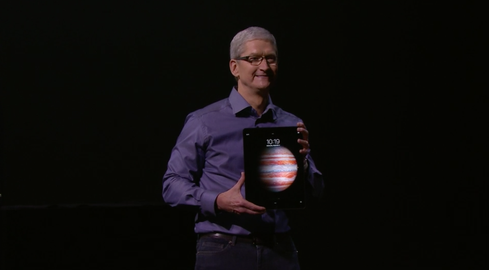Apple TV: Is It The Next Big Developer Platform?
Apple TV is revamped, but the company has plans bigger than a simple upgrade. Can it provide the next great platform for game developers and content?


iPhone 6S, iPad Pro, TV, Watch: Apple's Fall Lineup
iPhone 6S, iPad Pro, TV, Watch: Apple's Fall Lineup (Click image for larger view and slideshow.)
At Apple's Sept. 9 event, Apple TV received its first big upgrade in many years.
Although the set-top box itself has some nice new features to it, which may end up justifying in consumer's eyes its doubling in price, the real story here may be the ecosystem that Apple wants to develop around it.
Apple's CEO Tim Cook said at the announcement, "The future of TV is apps."
A media professional would have said "content."
Apps are one kind of content for the TV to display and work with. To Apple, apps seem to mean mainly games.
It's clear from the event that Apple hopes its stable of iOS developers will convert their smartphone games to run on the new tvOS, which is based on iOS. Indeed, Apple has shipped beta tools this week that will help anyone trying to do an iOS to tvOS port. The company hopes that developers will look at the Apple TV as another platform for their content.
However, this micro-gaming market already has quite a few players in there. For example, Amazon's Fire TV, Nvidia's Shield Android TV, and Razer's Forge micro-console have all tried to mix video gaming with media streaming. None have had a great success in it.
Aiding Apple's gaming positioning, the new remote that comes with the updated TV has built-in sensors that enable motion-controlled game play. The TV also supports third-party gamer remotes that use MFi networking like the Nimbus Steelseries Controller.
[Read more of InformationWeek's coverage of Apple TV.]
Content on the Apple TV will come from the TV App Store, modeled on the iPhone app store. Apple is promising that the content appearing during the official October launch will include "iTunes movies and TV shows. Netflix and Hulu. ABC and Disney. HBO and Showtime."
However, all of this entertainment content is pay-as-you-eat. It costs money. Additionally, aside from iTunes, this content is exactly what you can get on a Roku streaming stick that costs $50. Or on the current version of Apple TV that costs $70.
Apple needs to differentiate itself from other streamers, and to provide a compelling reason to view Apple TV. It needs its own TV channel.
Apple already has relationships with major content providers, forged when Apple began to sell movies and TV shows in the iTunes store.
Variety has reported that "a flirtation" with content providers has been going on for some time now. However, even the most optimistic observers do not think that an Apple-branded content channel would be possible until next year.
An Apple channel that is advertiser-supported -- and therefore free to the end-viewer -- would be a major competitive advantage for Apple. It would be a contrast to the other paid services available as apps for the TV, and could provide a badly needed compelling reason for customers to purchase the device.
About the Author(s)
You May Also Like
How to Amplify DevOps with DevSecOps
May 22, 2024Generative AI: Use Cases and Risks in 2024
May 29, 2024Smart Service Management
June 4, 2024







